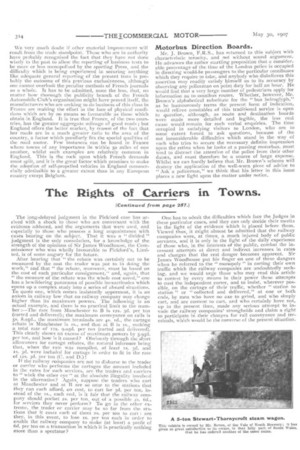The Rights of Carriers in Towns.
Page 2

If you've noticed an error in this article please click here to report it so we can fix it.
The long-delayed judgment in the Pickford case has arrived with a shock to those who are conversant with the evidence adduced, and the arguments that were used, and especially to those who possess a long acquaintance with cases bearing on the subject. That it was a " divided " judgment is the only consolation, for a knowledge of the .strength of the opinions of Sir James Woodhouse, the Commissioner who was wholly favourable to Pickford's, Limited, is of some augury for the future.
After hearing that " the rebate was certainly not to be measured by the cost the trader was put to in doing the work," and that " the rebate, moreover, must be based on the cost of each particular consignment," and, again, that " the measure of the rebate was the whole cost saved," one
has a bewildering panorama of possible inexactitudes which opens up a complex study into a series of absurd situations. To quote one, which comes insistently uppermost, it is an axiom in railway law that no railway company may charge higher than its maximum powers. The following is an actual example, and there is no practical limit to the number :—The rate from Manchester to B is 125. 3d. per ton (carted and delivered); the maximum conveyance on rails is 5s. 8.osd., the maximum terminals are 45. rd., the cartage rebate in Manchester is is., and that at B is IS., making a total rate of /is. 9.o5d. per ton (carted and delivered). This clearly shows an excess of maximum powers by 5.95d. per ton, and how is it caused? Obviously through the short allowances for cartage rebates, the natural inference being that, when the rate was compiled, at least is. 3d, and Is. 3d. were included for cartage in order to fit in the rate of 12S, 3d. per ton (C. and D.)! Tf the railway companies are not to disburse to the trader or carrier who performs the eartages the amount included in the rates for such services, are the traders, and carriers to " wink the other eye' " at the absolute illegality involved in the alternative? Again, suppose the traders who cart at Manchester and at B are so near to the stations that they can each afford, on cost, to cart for 3d. per ton, instead of the is., each end, is it fair that the railway company should pocket 2s. per ton, out of a possible 2s. 6d., for services they never perform? To go to the other extreme, the trader or carrier may be so far from the stations that it costs each of them 2ti.. per ton to cart : are they, in this event, to lose is. per ton each in order to enable the railway company to make (at least) a profit of 6d. per ton on a transaction in which it is practically nothing more than a spectator? One has to admit the difficulties which face the Judges in these particular cases, and they can only decide their merits in the light of the evidence which is placed before them. Viewed thus, it might almost be admitted that the railway companies were, at times, a much injured body of public servants, arid it is only in the light of the daily experience of those who, in the interests of the public, combat the incessant attempts at direct and indirect increases in rates and charges that the real danger becomes apparent. Sir James Woodhouse put his finger on one of these dangers when he referred to the " monopoly " in carting their own traffic which the railway companies are undoubtedly seeking, and we would urge those who may read this article to contest by every means in their power these attempts to oust the independent carter, and to insist, wherever possible, on the cartage of their traffic, whether " station to station " or " collected and delivered," at one or both ends, by men who have no axe to grind, and who simply cart, and are content to cart, and who certainly have not, up to the present time, made any serious attempt to invade the railway companies' strongholds and claim a right to participate in their charges for rail conveyance and terminals, which would be the converse 'ofthe present situation.


























